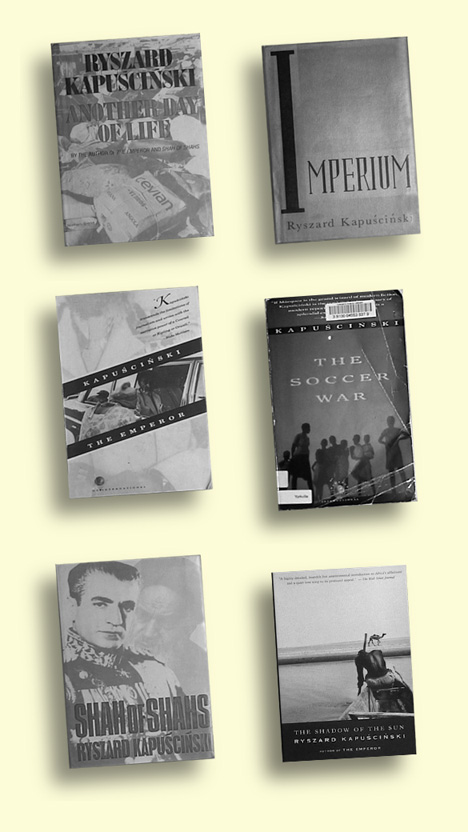Ryszard Kapuscinski 1932-2007

I was hoping he'd live forever and eventually write about everything.
L.M., can I borrow some of these books? I finally read Shah of Shahs and it blew me away. Kapucinski tells the story with a lot of emotional analysis and abstractions, it's a kind of subjective positioning that works really well for me. Here are some excerpts, bits I keep thinking about. [from Ryzsard Kapuscinski,Shah of Shahs (New York: Vintage International), 1992.
When thinking about the fall of any dictatorship, one should have no illusions that the whole system comes to an end like a bad dream with that fall. The physical existence of the system does indeed cease. But its psychological and social results live on for years, and even survive in the form of subconsciously continued behaviour. A dictatorship that destroys the intelligentsia and culture leaves behind itself an empty, sour field on which the tree of thought won't grow quickly. It is not always the best people who emerge from hiding, from the corners and cracks of that farmed-out field, but often those whose thick skin and internal resilience have ensured their survival. In such circumstances history begins to turn in a tragic, vicious circle from which it can sometimes take a whole epoch to break free.
pg. 58
The causes of revolution are usually sought in objective conditions -- general poverty, oppression, scandalous abuses. But this view, while correct, is one-sided. After all, such conditions exist in a hundred countries, but revolutions erupt rarely. What is needed is the consciousness of poverty and the consciousness of oppression and the conviction that poverty and oppression are not the natural order of this world. It is curious that in this case, experience in and of itself , no matter how painful, does not suffice. The indispensable catalyst is the word, the explanatory idea. More than petards or stilettos, therefore, words—uncontrollable words, circulating freely, underground, rebelliously, not gotten up in dress uniforms, uncertified—frighten tyrants. But sometimes it is the official, uniformed, certified wordsd that bring about the revolution.
pg.103
It is a mistaken assumption that nations wronged by history (and they are in the majority) live with the constant thought of revolution, that they see it as the simplest solution. Every revolution is a drama, and humanity instinctively avoids dramatic situations. Even if we find ourselves in such a situation we look feverishly for a way out, we seek calm and, most often, the commonplace. That is why revolutions never last long...
pg. 104
|
Ryszard Kapuscinski 1932-2007
I was hoping he'd live forever and eventually write about everything.
- L.M. 1-26-2007 4:27 am
L.M., can I borrow some of these books? I finally read Shah of Shahs and it blew me away. Kapucinski tells the story with a lot of emotional analysis and abstractions, it's a kind of subjective positioning that works really well for me. Here are some excerpts, bits I keep thinking about. [from Ryzsard Kapuscinski,Shah of Shahs (New York: Vintage International), 1992.
- sally mckay 6-19-2007 7:54 pm